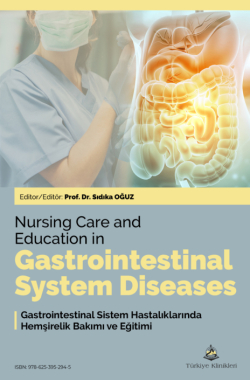Nursing Care and Education in Irritable Bowel Syndrome
Zeynep ERDOĞANa
aZonguldak Bülent Ecevit University Ahmet Erdoğan Vocational School of Health Services, Health Care Services, Department of Aged Care, Zonguldak, Türkiye
Erdoğan Z. Nursing care and education in irritable bowel syndrome. In: Oğuz S, ed. Nursing Care and Education in Gastrointestinal System Diseases. 1st ed. Ankara: Türkiye Klinikleri; 2024. p.77-81.
ABSTRACT
Irritable bowel syndrome (IBS) is a functional gastrointestinal disorder characterized by recurrent abdominal pain combined with changes in bowel habits, which can be costly and potentially life-impairing. The recurring and persistent symptoms of IBS disease can significantly affect patients’ quality of life. In their daily practices, nurses often encounter patients who seek healthcare to manage their IBS, as well as patients who initially seek help for other illnesses but also have IBS symptoms. By considering the causes of IBS and the symptoms that people with IBS may experience, nurses should provide education to the patients and their families about lifestyle changes. They should also implement available pharmacological treatments for IBS and evidence-based nursing interventions for issues such as diet, stress and anxiety management, to be able to improve the underlying and contributing factors to IBS.
Keywords: Irritable bowel syndrome; constipation; diarrhea; gastrointestinal diseases; nursing care; functional bowel disorder
Kaynak Göster
Referanslar
- Kaya D. Irritable Bowel Syndrome. J. Turk Fam Phy. 2019;10 (4):205-13. [Crossref]
- Erdoğan Z, Kurçer MA, Budak B, Aydemir S. The Effect of Gastrointestinal Symptoms on Hopelessness and Depression in Patients with Irritable Bowel Syndrome. HSP. 2018;5(3):353-9. [Crossref]
- Ford AC, Sperber AD, Corsetti M, Camilleri M. Irritable bowel syndrome. Lancet. 2020;396(10263):1675-88. [Crossref] [PubMed]
- Longstreth GF, Wilson A, Knight K, Wong J, Chiou CF, Barghout V, et al. Irritable bowel syndrome, health care use, and costs: a U.S. managed care perspective. Am J Gastroenterol. 2003;98(3):600-7. [Crossref] [PubMed]
- Can G, Yılmaz B. Approaches to diagnosis and treatment of irritable bowel syndrome. Current G astroenterology. 2015;19(3):171-81
- World Gastroenterology Organisation Global Guidelines.Irritable Bowel Syndrome: a Global Perspective. 2015. Accessed Date:20.2.2024 [Link]
- Oka P, Parr H, Barberio B, Black CJ, Savarino EV, Ford AC. Global prevalence of irritable bowel syndrome according to Rome III or IV criteria: a systematic review and meta-analysis. Lancet Gastroenterol Hepatol. 2020;5(10):908-17. [Crossref] [PubMed]
- Karaman N, Türkay C, Yönem O. Irritable bowel syndrome prevalence in city center of Sivas. Turk J Gastroenterol. 2003;14(2):128-31.
- Celebi S, Acik Y, Deveci SE, Bahcecioglu IH, Ayar A, Demir A, Durukan P. Epidemiological features of irritable bowel syndrome in a Turkish urban society. J Gastroenterol Hepatol. 2004;19(7):738-43. [Crossref] [PubMed]
- Yilmaz S, Dursun M, Ertem M, Canoruc F, Turhanoğlu A. The epidemiological aspects of irritable bowel syndrome in Southeastern Anatolia: a stratified randomised community-based study. Int J Clin Pract. 2005;59(3):361-9. [Crossref] [PubMed]
- Saha L. Irritable bowel syndrome: pathogenesis, diagnosis, treatment, and evidence-based medicine. World J Gastroenterol. 2014;20(22):6759-73. [Crossref] [PubMed] [PMC]
- Akyuz F. Irritable Bowel Syndrome, Current Gastroenterology Journal, 2016;20(4):415-20.
- Chang FY, Lu CL. Treatment of irritable bowel syndrome using complementary and alternative medicine. J Chin Med Assoc. 2009;72(6):294-300. [Crossref] [PubMed]
- Canavan C, West J, Card T. The epidemiology of irritable bowel syndrome. Clin Epidemiol. 2014;6:71-80. [Crossref] [PubMed] [PMC]
- Harvey S, Matthai S, King DA. Arch Dis Child Educ Pract Ed. 2023;108:335-9. [Crossref] [PubMed]
- Yang Q, Wei ZC, Liu N, Pan YL, Jiang XS, Tantai XX, et al. Predictive value of alarm symptoms in Rome IV irritable bowel syndrome: A multicenter cross-sectional study. World J Clin Cases. 2022;10(2):563-75. [Crossref] [PubMed] [PMC]
- Palsson OS, Whitehead WE, van Tilburg MA, Chang L, Chey W, Crowell MD, et al. Rome IV Diagnostic Questionnaires and Tables for Investigators and Clinicians. Gastroenterology. 2016:S0016-5085(16)00180-3.
- Bonetto S, Fagoonee S, Battaglia E, Grassini M, Saracco GM, Pellicano R. Recent advances in the treatment of irritable bowel syndrome. Pol Arch Intern Med. 2021;131(7-8):709-15. [Crossref] [PubMed]
- Kassebaum-Ladewski A, Poppers DM, Brenner DM. Effective Communication Strategies and Tools for Improving Treatment Outcomes in Patients With Chronic Idiopathic Constipation and Irritable Bowel Syndrome With Constipation. Am J Gastroenterol. 2022;117(4S):S14-S20. [Crossref] [PubMed]
- Coutts A. Nursing management of irritable bowel syndrome. Nurs Stand. 2019;34(5):76-81. [Crossref] [PubMed]
- Weaver KR, Melkus GD, Henderson WA. Irritable Bowel Syndrome. Am J Nurs. 2017;117(6):48-55. [Crossref] [PubMed] [PMC]
- Salari-Moghaddam A, Keshteli AH, Esmaillzadeh A, Adibi P. Adherence to the pro-inflammatory diet in relation to prevalence of irritable bowel syndrome. Nutr J. 2019;18(1):72. [Crossref] [PubMed] [PMC]
- Black CJ, Staudacher HM, Ford AC. Efficacy of a low FODMAP diet in irritable bowel syndrome: systematic review and network meta-analysis. Gut. 2022;71(6):1117-26. [Crossref] [PubMed]
- Weaver KR, Melkus GD, Henderson WA. Irritable Bowel Syndrome. Am J Nurs. 2017;117(6):48-55. [Crossref] [PubMed] [PMC]
- Tuck C, Barrett J. Re-challenging FODMAPs: the low FODMAP diet phase two. J Gastroenterol Hepatol. 2017;32 Suppl 1:11-15. [Crossref] [PubMed]
- Spiller R. Impact of Diet on Symptoms of the Irritable Bowel Syndrome. Nutrients. 2021;13(2):575. [Crossref] [PubMed] [PMC]
- Zhang T, Zhang C, Zhang J, Sun F, Duan L. Efficacy of Probiotics for Irritable Bowel Syndrome: A Systematic Review and Network Meta-Analysis. Front Cell Infect Microbiol. 2022;12:859967. [Crossref] [PubMed] [PMC]
- Bremner H. Nurse-led hypnotherapy: an innovative approach to Irritable Bowel Syndrome. Complement Ther Clin Pract. 2013;19(3):147-52. [Crossref] [PubMed]
- Jenner P. Beat Your Irritable Bowel Syndrome in 7 Simple Steps. 2018. Hodder & Stoughton, London
- Ruggiero L, Andretta V, Soldaini C, Fricano I, Mancusi M. The role of the nurse in the management of irritable bowel syndrome: a narrative review. Translational Medicine @ UniSa 2023;25(1):28-37. [Crossref]

